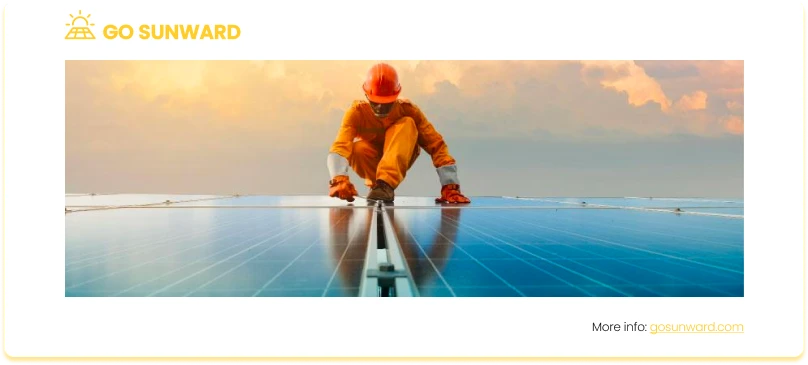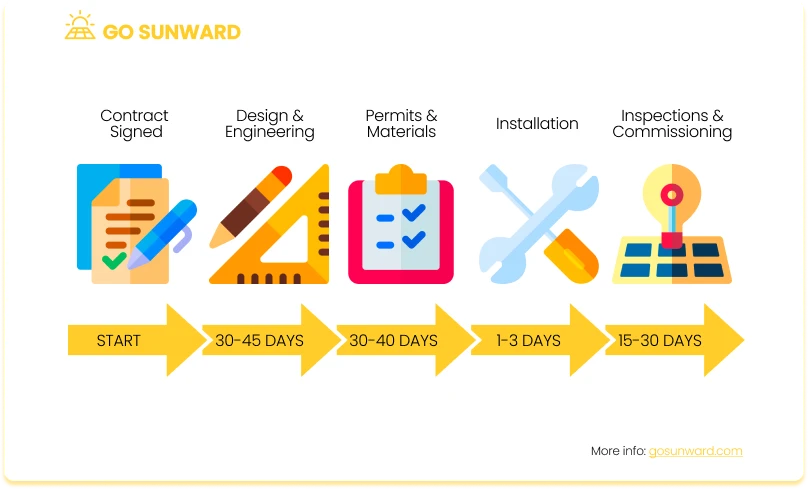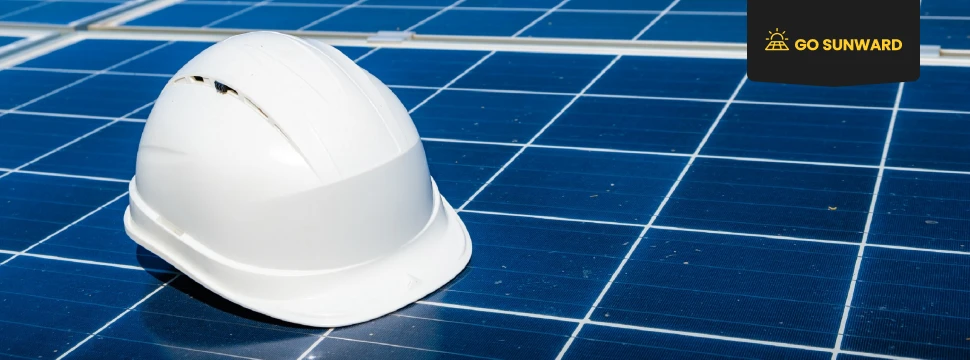Solar Panel Installation: How To Background Check Your Installer
The allure of harnessing the power of the sun to generate clean and renewable energy for your house has never been stronger. However, in embarking on this journey towards a greener future, one critical aspect often overlooked is the selection of a reputable and reliable solar panel installer. The significance of this choice cannot be overstated, as it directly impacts the efficiency, safety, and longevity of your solar panel system. To ensure that your solar investment is both sound and enduring, it is essential to conduct a thorough background check on your chosen solar panel installation professional.
In this article, we will guide you through the key factors and steps involved in this crucial process, empowering you to make an informed decision that aligns with your sustainability goals and energy needs.
Understanding The Role Of Solar Panel Installers & DIY Possibilities
First things first, what do solar installers do? Do I need one, or can I do it myself?
Solar installers are skilled professionals specializing in the installation, upkeep, and repair of solar photovoltaic (PV) systems. Their roles encompass various crucial tasks, including a site survey, system design, permit handling, panel and component installation, electrical work, testing, inspections, and ongoing maintenance. Furthermore, they play a vital role in educating customers about system performance and energy efficiency.
While it is technically feasible for individuals to undertake a DIY solar panel installation, it can be difficult without a prior background in engineering. Safety concerns, the need for technical expertise, the intricacies of permits and regulations, and the availability of warranties and financing options through professional installations make DIY solar a less viable choice for most homeowners. DIY solar kits are available, but they are best suited for individuals with strong backgrounds in electrical and construction work.
Opting for a qualified solar installer is typically the wiser choice, ensuring a safe and efficient installation that maximizes the advantages of solar energy, including the potential incorporation of batteries for your property. To delve deeper into the DIY vs. professional installation debate, explore our informative article.

The Benefits Of Using A Solar Panel Installation Professional
When it comes to the installation of solar panel systems, the role of the installer cannot be overstated. They play a pivotal part in ensuring the efficiency, safety, and overall success of your solar energy setup. Here are some of the key benefits of choosing a solar installer to help you:
Ensuring Efficiency: A skilled and experienced installer possesses the knowledge and expertise to design and set up your solar panel system for optimal performance. They consider factors such as the angle, orientation, and placement of the panels to maximize sunlight capture. This attention to detail translates into higher energy production, directly impacting your electricity savings.
Safeguarding Safety: Safety is a non-negotiable aspect of any solar installation. Professional installers adhere to stringent safety protocols to protect you, your property, and their team during the installation process. They are well-versed in electrical work and follow industry best practices to minimize any potential hazards.
Avoiding Potential Issues: Solar panel installations involve many technical elements, from wiring to electrical connections. An experienced installer is well-equipped to troubleshoot and resolve any issues arising during or after installation. Their expertise helps prevent system malfunctions, ensuring the long-term reliability of your solar energy system.
Maximizing Your Investment: Investing in solar panels is a significant financial commitment. A trustworthy installer ensures that your investment yields the expected returns by delivering an efficient and trouble-free system. This includes selecting high-quality components, adhering to local regulations, and providing proper documentation for permits and warranties.
Long-Term Benefits: Beyond the initial installation, a reliable installer offers ongoing maintenance and support services. This means that if you encounter any issues or require system upgrades in the future, you have a trusted professional to turn to.
Now, let’s delve into the different stages of conducting background checks on your solar installer. The following sections will provide you with a step-by-step guide to this process.
Background Check Your Installer 1: Research!
When it comes to finding the right solar panel installer, conducting thorough research is a crucial first step. Here’s how to navigate this phase effectively:
Starting Your Research
Begin your search for potential solar installers by exploring various avenues:
- Online Searches: Utilize the power of the internet to identify solar installers in your area. Conduct online searches using keywords like “solar panel installers near me” or “local solar companies.” This will generate a list of potential candidates to consider.
- Referrals: Seek recommendations from friends, family members, or neighbors who have previously installed solar panels. Personal referrals often provide valuable insights into an installer’s professionalism, work quality, and overall experience.
- Local Directories: Consult local business directories or solar industry associations. These directories typically feature listings of certified solar installers, complete with contact details and areas of expertise. They serve as a valuable resource for finding reputable professionals in your region.
Checking for Licenses, Certifications, and Insurance
Once you’ve compiled a list of potential installers, the next step is to verify their qualifications and credentials. This critical step ensures you work with a legitimate and competent installer. Here’s what to focus on:
- Licenses: Check whether the installer holds the necessary licenses to install solar panels in your area. Licensing requirements can vary by location, so it’s essential to confirm that they comply with local regulations. A licensed installer will likely adhere to industry standards and best practices.
- Certifications: Look for certifications demonstrating the installer’s expertise and commitment to quality. Industry-recognized certifications, such as those from organizations like NABCEP (North American Board of Certified Energy Practitioners), can be a strong indicator of a professional’s competence in solar installations.
- Insurance: Ensure that the installer carries adequate insurance coverage. This should include liability insurance and workers’ compensation coverage. Insurance protects you in the event of accidents, damages, or injuries that may occur during the installation process. It also reflects the installer’s commitment to safety and accountability.
By following these research guidelines, you can compile a list of reputable solar installers.
Background Check Your Installer 2: Read Reviews & Seek References
When it comes to selecting the right solar panel installation pro for your project, delving into their reputation becomes an essential step.
Customer reviews and testimonials serve as windows into the experiences of those who have previously worked with the solar installer. By perusing these accounts, you gain insights into various aspects of the installer’s performance, including the quality of installation work, customer service, costs and professional manner. Furthermore, occasionally, issues may arise during or after installation. Reading reviews can reveal how effectively the installer addresses and resolves these problems, demonstrating their commitment to customer satisfaction.
Taking the extra step to request references from the solar installer can offer you a more personalized and in-depth perspective. References provide firsthand insights into the entire experience of working with the installer. You can inquire about their overall satisfaction, the installer’s professionalism, and any challenges they may have encountered.
References can also share valuable information about the long-term performance of their solar panel systems. This insight is particularly valuable as it gives you an understanding of how well the installation holds up over time. Speaking with references allows you to verify the installer’s claims and promises. It offers a level of assurance that goes beyond online reviews and testimonials.
Background Check Your Installer 3: Review Past Solar Panel Installation Projects
Another crucial aspect of conducting a background check on your solar installer is thoroughly reviewing their past projects and portfolio. This step provides invaluable insights into their workmanship and the types of solar systems and solar arrays they have experience installing.
By examining the installer’s portfolio, you gain a visual representation of their previous work. Look for:
- Aesthetic Quality: Assess the visual appeal of the installed solar panels. Well-organized and aesthetically pleasing installations are indicative of attention to detail and professionalism.
- Structural Integrity: Check for the robustness and structural integrity of the installations. Solar panels should be securely mounted and positioned for optimal sunlight exposure.
- Neat Wiring and Components: Inspect the wiring and components of the solar system, such as the inverter and racking system. Clean and organized wiring, along with neatly installed components, demonstrate a commitment to excellence.
Reviewing past solar panel installation projects can also help you determine if the installer has experience with the specific type of solar system you desire. Consider things like:
- System Size: Check if they have installed systems of a similar size to what you are planning. This indicates familiarity with the intricacies of your project.
- System Type: Assess whether they have experience with the type of solar panels or technology you prefer, such as monocrystalline, polycrystalline, or thin-film panels.
- Specialized Installations: If you have unique requirements, such as off-grid or hybrid solar systems, review past projects that align with your needs.
Don’t hesitate to inquire about customer satisfaction with past projects. Reach out to the homeowners or businesses where the installer has completed solar installations and ask about their overall experience.
Relevant questions might include:
- Were you satisfied with the quality of the work?
- Did the installer adhere to the agreed timelines?
- How has the system performed over time?
- Were there any issues, and how were they resolved?
Background Check Your Installer 4: Obtain Multiple Quotes
When considering a solar panel installation, one crucial step is to obtain detailed quotes from multiple installers.
Different solar installers may offer varying pricing structures for their services. Obtaining multiple quotes allows you to compare costs (including the price of installation, equipment, and any additional services like warranties) and it helps you identify the best value for your investment. Sometimes, higher upfront costs may be justified by superior equipment or service quality.
Solar projects can be financed in various ways, from outright purchases to leasing or financing plans. Obtaining multiple quotes allows you to explore financing choices to suit your budget and assess the terms and conditions of financing plans, including interest rates, repayment periods, and any associated fees.
Ultimately, obtaining multiple quotes empowers you to make an informed decision. It ensures that you’re considering not only the cost but also the overall value, quality, and financing options associated with your solar panel installation. By doing so, you can choose the installer and package that aligns best with your specific needs and preferences.
Background Check Your Installer 5: Checking For Red Flags
In the pursuit of a trustworthy solar panel installer, it’s vital to keep an eye out for potential red flags. These warning signs can help you steer clear of unreliable or unscrupulous installers.
Here’s some top tips on how to spot them:
High-Pressure Sales Tactics: Be wary if an installer uses high-pressure sales tactics to rush you into quick decisions. Reputable installers will offer information and time to make an informed choice.
Lack of Transparency: Transparency is essential in any business transaction. If an installer seems evasive or hesitant to answer your questions, it could be a red flag. Trustworthy installers are open about their services, pricing, and warranties.
Unverifiable Claims: Be cautious if installers make extravagant claims without offering evidence or references. Reliable installers can back their claims with verifiable data, customer testimonials, and references.
Unrealistic Promises: If an installer guarantees savings that seem too good to be true, exercise caution. While solar panels can yield significant savings, they are influenced by various factors, and overly optimistic promises may indicate dishonesty.
Lack of Licensing and Insurance: Ensure the installer holds the necessary licenses and insurance. Failure to provide proof of licensing or insurance is a substantial red flag.
No Written Agreements: Avoid installers who refuse to provide written agreements or contracts. A written agreement safeguards both you and the installer by clearly specifying the project’s scope, timelines, costs, and warranties.
Negative Reviews and Feedback: Research the installer online and check for negative reviews or complaints from previous customers. A few negative reviews may be expected, but a consistent pattern of negative feedback is cause for concern.
Refusal to Provide References: Request references from past customers, and be cautious if the installer declines to provide them. Conversations with previous clients can offer valuable insights into their experiences.Trust Your Instincts: Ultimately, trust your instincts. If something feels off or you’re uncomfortable with the installer’s approach, consider it a red flag. Your peace of mind and confidence in the installer are vital for a successful solar panel installation.
Background Check Your Installer 6: Meeting With The Solar Panel Installation Company
Meeting with a solar panel installer before committing to a solar project is an invaluable step that brings numerous benefits to the table. Beyond the technicalities of solar systems and installations, these face-to-face interactions serve as a platform to establish a personal connection. In an era where digital communication often prevails, these meetings offer a unique opportunity to build trust and rapport with the installer. By sitting down and discussing your project in person, you can better understand their demeanor, professionalism, and approach to work. This personal connection can instil confidence and ensure a smoother collaboration throughout the project.
Moreover, these meetings allow you to clarify expectations and project requirements directly with the installer. Whether it’s articulating your energy goals, specifying any aesthetic preferences, or addressing concerns, the clarity achieved through face-to-face conversations ensures that both parties are aligned. This shared understanding forms the foundation for a successful collaboration, reducing the likelihood of misunderstandings or discrepancies down the line. Additionally, by meeting with the installer, you can assess their expertise, experience, and approach to problem-solving, which is crucial for the smooth execution of your solar project. Ultimately, these meetings foster transparency, trust, and a strong working relationship, setting the stage for a successful and efficient solar panel installation.
What Are The Next Steps For Your Solar Panel Installation?
Having conducted a thorough background check on your chosen solar installer and being satisfied with the information you’ve gathered, what comes next in the process?
The journey towards a solar installation typically unfolds in several well-defined steps. It all kicks off with an initial consultation with a solar installation company. During this crucial phase, the solar experts delve into your specific energy needs, financial considerations, and overarching goals. Following this, a meticulous site assessment enters the picture. Here, the professionals examine various site-specific factors such as sunlight exposure, potential shading, and the condition of your roof. These assessments are pivotal in determining the most advantageous placement for your solar panels.
Once your site has undergone scrutiny, the solar installer proceeds to craft a tailored solar energy system that aligns seamlessly with your unique requirements. This thoughtful design phase considers intricate details like your energy consumption patterns and the peculiarities of your local climate. With the design in hand, the permitting process kicks off. The solar panel installation company handles all the necessary paperwork and permits, ensuring smooth interactions with local authorities and utility companies to guarantee compliance with all regulations.
The pivotal installation phase follows suit. This is where the solar panels are securely mounted, precisely connected to inverters, and wired into your property’s electrical panel. Each step is carried out with meticulous attention to detail, ensuring the safety and efficiency of your solar energy system. Subsequently, rigorous testing and inspections come into play, serving as the litmus test for the system’s proper operation and safety. Once the system receives the green light from inspectors, it is activated, and you can start harnessing solar energy. To keep tabs on your system’s performance and energy production, solar monitoring systems come into play, providing real-time insights.
In the long run, the efficiency and durability of your solar system are maintained through regular maintenance services offered by solar installers. This includes periodic cleaning of the panels, comprehensive damage assessments, and replacing faulty components. Throughout this entire process, your chosen solar installer remains your steadfast ally, providing unwavering support and guidance, ensuring a seamless transition to clean and renewable energy for your property.

Conclusion
Conducting a comprehensive background check on your solar panel installer is an essential step in ensuring a successful and reliable solar installation. By following the steps outlined in this guide, you can make an informed decision, select a reputable installer, and embark on your journey towards clean and sustainable energy.




